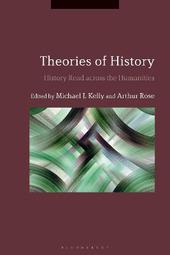
|
Theories of History: History Read across the Humanities
Hardback
Main Details
| Title |
Theories of History: History Read across the Humanities
|
| Authors and Contributors |
Edited by Dr. Michael J. Kelly
|
|
Edited by Dr Arthur Rose
|
| Physical Properties |
| Format:Hardback | | Pages:264 | | Dimensions(mm): Height 234,Width 156 |
|
| ISBN/Barcode |
9781474271301
|
| Classifications | Dewey:901 |
|---|
| Audience | | Tertiary Education (US: College) | |
|---|
| Illustrations |
11 bw illus
|
|
Publishing Details |
| Publisher |
Bloomsbury Publishing PLC
|
| Imprint |
Bloomsbury Academic
|
| Publication Date |
17 May 2018 |
| Publication Country |
United Kingdom
|
Description
This book is open access and available on www.bloomsburycollections.com. It is funded by Knowledge Unlatched. In a unique approach to historical representations, the central question of this book is 'what is history?' By describing 'history' through its supplementary function to the field of history, rather than the ground of a study, this collection considers new insights into historical thinking and historiography across the humanities. It fosters engagement from around the disciplines in historical thinking and, from that, invites historians and philosophers of history to see clearly the impact of their work outside of their own specific fields, and encourages deep reflection on the role of historical production in society. As such, Theories of History opens up for the first time a truly cross-disciplinary dialogue on history and is a unique intervention in the study of historical representation. Essays in this volume discuss music history, linguistics, theater studies, paintings, film, archaeology and more. This book is essential reading for those interested in the practice and theories of history, philosophy, and the humanities more broadly. Readers of this volume are not only witness to, but also part of the creation of, radical new discourses in and ways of thinking about, doing and experiencing history.
Author Biography
Michael J. Kelly is Visiting Assistant Professor in Comparative Literature at the State University of New York at Binghamton, USA. He is the General Director of the project Networks and Neighbours and Co-General Director, with Dolores Castro, of the series Visigothic Symposia. Arthur Rose is a Postdoctoral Research Fellow in English Studies and Medical Humanities at Durham University, UK. He is the author of Literary Cynics: Borges, Beckett, Coetzee (Bloomsbury, 2017).
ReviewsThe contributions are invariably thought provoking ... [For] those in the field and interested in the theory of history it is a rewarding read and a valuable contribution on multiple levels. * International Network for the Theory of History * Theories of History: History read across the Humanities is a major achievement in more than one sense. It instigates thinking about history form a refreshingly new perspective, inspired by the work of Alain Badiou, and staring from the following preamble: History is not about finding or creating truths; truths find history. The book raises all the right questions, to which it provides a truly engaging and genuinely collective response. * Alenka Zupancic, Professor of Philosophy and Psychoanalysis, Research Centre of the Slovenian Academy of Sciences and Arts, Slovenia * This intellectually elegant collection of essays explores the complexities of historical theory as it applies to the humanities, broadly conceived. Its learned contributors examine the implications of historical theory to events, musical interpretation, art as a form of "visual writing," the contexts and rhetorics of conceptions of time, and the implications of imposing boundaries between the past, present, and future, among other absorbing topics. A collective work of erudition, insight, and scholarly imagination, Theories of History neatly challenges disciplinary boundaries. It will reward attentive readers in every humanistic field. * William G. Rosenberg, Professor of History Emeritus, University of Michigan, USA * In a series of case studies and theoretical reflections from across the humanities-from archaeology to law to rhetoric-the book gives a vivid snapshot of the most progressive thinking on history today. And if, in its editors' conviction of the power of Alain Badiou's 'evental' vision of history, we seem to approach a theology (rather than a philosophy) of history, the book is exemplary in its attention to the diverse contexts in which history emerges as a vital profession and invigorating problem. * Alan O'Leary, Professor of Film and Cultural Studies, University of Leeds, UK *
|